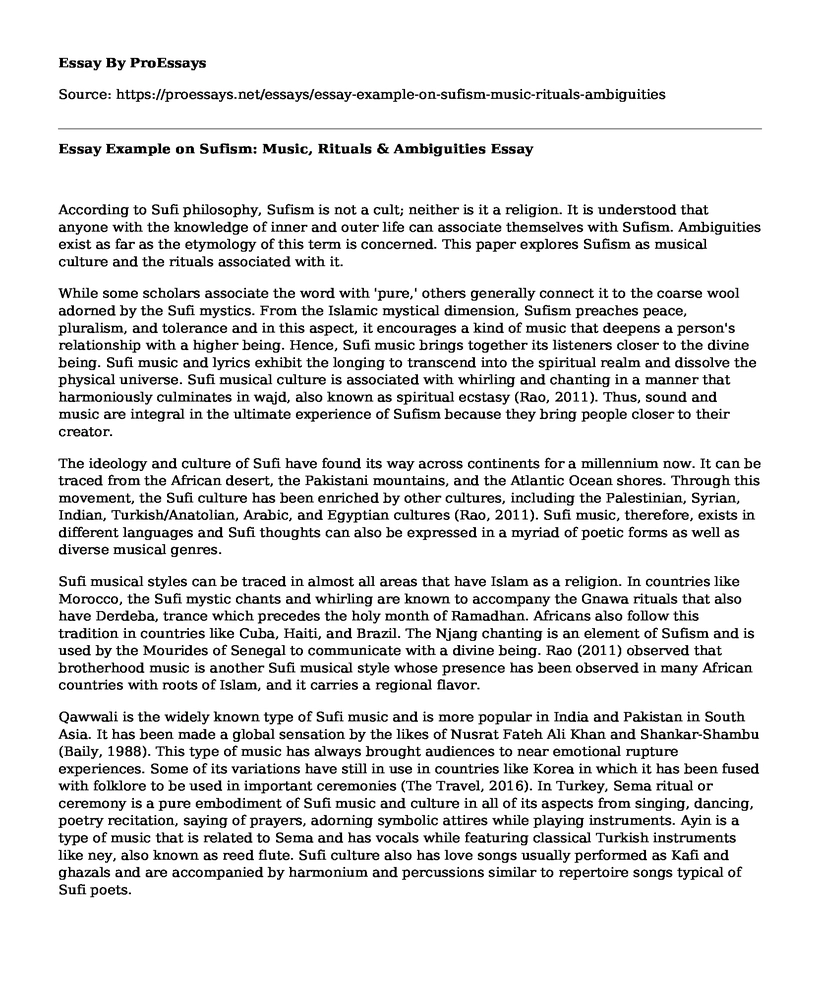According to Sufi philosophy, Sufism is not a cult; neither is it a religion. It is understood that anyone with the knowledge of inner and outer life can associate themselves with Sufism. Ambiguities exist as far as the etymology of this term is concerned. This paper explores Sufism as musical culture and the rituals associated with it.
While some scholars associate the word with 'pure,' others generally connect it to the coarse wool adorned by the Sufi mystics. From the Islamic mystical dimension, Sufism preaches peace, pluralism, and tolerance and in this aspect, it encourages a kind of music that deepens a person's relationship with a higher being. Hence, Sufi music brings together its listeners closer to the divine being. Sufi music and lyrics exhibit the longing to transcend into the spiritual realm and dissolve the physical universe. Sufi musical culture is associated with whirling and chanting in a manner that harmoniously culminates in wajd, also known as spiritual ecstasy (Rao, 2011). Thus, sound and music are integral in the ultimate experience of Sufism because they bring people closer to their creator.
The ideology and culture of Sufi have found its way across continents for a millennium now. It can be traced from the African desert, the Pakistani mountains, and the Atlantic Ocean shores. Through this movement, the Sufi culture has been enriched by other cultures, including the Palestinian, Syrian, Indian, Turkish/Anatolian, Arabic, and Egyptian cultures (Rao, 2011). Sufi music, therefore, exists in different languages and Sufi thoughts can also be expressed in a myriad of poetic forms as well as diverse musical genres.
Sufi musical styles can be traced in almost all areas that have Islam as a religion. In countries like Morocco, the Sufi mystic chants and whirling are known to accompany the Gnawa rituals that also have Derdeba, trance which precedes the holy month of Ramadhan. Africans also follow this tradition in countries like Cuba, Haiti, and Brazil. The Njang chanting is an element of Sufism and is used by the Mourides of Senegal to communicate with a divine being. Rao (2011) observed that brotherhood music is another Sufi musical style whose presence has been observed in many African countries with roots of Islam, and it carries a regional flavor.
Qawwali is the widely known type of Sufi music and is more popular in India and Pakistan in South Asia. It has been made a global sensation by the likes of Nusrat Fateh Ali Khan and Shankar-Shambu (Baily, 1988). This type of music has always brought audiences to near emotional rupture experiences. Some of its variations have still in use in countries like Korea in which it has been fused with folklore to be used in important ceremonies (The Travel, 2016). In Turkey, Sema ritual or ceremony is a pure embodiment of Sufi music and culture in all of its aspects from singing, dancing, poetry recitation, saying of prayers, adorning symbolic attires while playing instruments. Ayin is a type of music that is related to Sema and has vocals while featuring classical Turkish instruments like ney, also known as reed flute. Sufi culture also has love songs usually performed as Kafi and ghazals and are accompanied by harmonium and percussions similar to repertoire songs typical of Sufi poets.
Conclusion
In conclusion, Sufism as a culture is widely known across all continents. Sufi music is central to most cultural and religious practices and rituals. This is the reason why Sufi music is regarded as music of the soul because its practices are closer to religion.
References
Baily, J. (1988). Sufi Music of India and Pakistan: Sound, Context and Meaning in Qawwali. Popular Music, 7(2), 223-225. doi: 10.1017/s0261143000002816
Rao, S. (2011). Sufi music: The song of the soul. Retrieved 17 September 2019, from https://economictimes.indiatimes.com/sufi-music-the-song-of-the-soul/articleshow/7840662.cms?from=mdr
The Travel. (2016). Korean folk dance (Pungmul) at unhyeongung palace, Seoul Korea [HD] [Video]. Retrieved from https://www.youtube.com/watch?reload=9&v=jy6bfus4pMY
Cite this page
Essay Example on Sufism: Music, Rituals & Ambiguities. (2023, Feb 12). Retrieved from https://proessays.net/essays/essay-example-on-sufism-music-rituals-ambiguities
If you are the original author of this essay and no longer wish to have it published on the ProEssays website, please click below to request its removal:
- Questions and Answers on Kant
- Clara Schumann and Louise Farrenc Biography
- Movie Analysis Essay on Peru: "The Curse of the Inca Gold" and "Paradise Lost - Nauru"
- Ethical Actions: Philosophers' Definitions Compared - Essay Sample
- Essay Sample on Jewish Museum, Camden: Preserving Jewish Heritage & East End History
- Inside African American History Museum: Research Paper on Exploring Culture & Heritage
- Essay on Daily News Building: Two Brooklyn Museum Photos Compared and Contrasted







